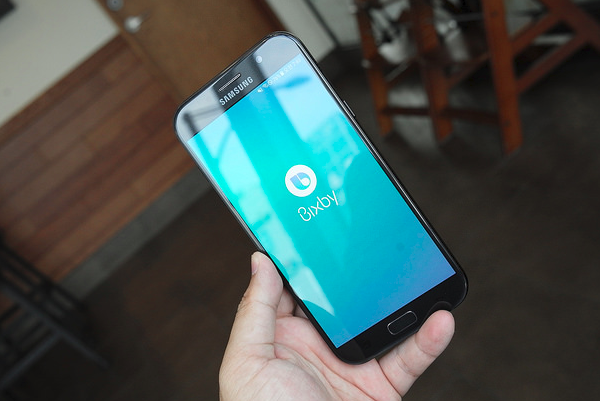 EMERGING TECH
EMERGING TECH
 EMERGING TECH
EMERGING TECH
 EMERGING TECH
EMERGING TECH
Bixby, Samsung Electronics Co. Ltd.’s smart digital assistant, no longer will be trapped inside the Korean giant’s smartphones, as the company today announced plans to make it available on its own smart TVs and refrigerators and eventually other companies’ products.
The move, announced today at Samsung’s developer conference in San Francisco, is an attempt to rebrand the consumer electronics giant as more than a hardware company, showing it can unify its products under smarter software and in the cloud. In particular, Bixby 2.0 will come to Samsung TVs next year in the U.S. and Korea and later to its own appliances, as well as to non-Samsung products “in the near future” through deals with outside software developers.
The new Bixby, Samsung claimed today, is smarter, more personalized and sports better voice recognition capabilities. But the real push this week is to developers, who are key to creating new capabilities for Bixby, or any digital assistant for that matter.
DJ Koh, president of Samsung’s mobile communications business, said this morning during the conference keynote that Samsung aims to unite its disparate “internet of things” services such as SmartThings, Connect and ARTIK into one platform, which it calls SmartThings Cloud. It’s also joining with Google LLC in augmented reality with the Android maker’s ARCore software development kit.
“They’re finally trying to pull together all the parts of Samsung,” Maribel Lopez, founder and principal analyst at Lopez Research, said during an onsite interview on theCUBE, SiliconANGLE Media’s live streaming studio. “But they’re a little cryptic on the details,” she added, so Samsung will need to make sure it’s clear to developers, 6,000 of whom are at the conference, what they can do not only with Samsung devices but others as well.
Samsung clearly views Bixby as an avenue to make all its devices smarter and more useful. “Today’s assistants are useful, but ultimately still play a limited role in people’s lives,” Eui-Suk Chung, executive vice president and head of service intelligence in Samsung Electronics’ mobile communications business, wrote in a blog post today. “People use them to set timers and reminders, answer trivial questions, etc. We see a world where digital assistant play a bigger role, an intelligent role, where one day everything from our phones, to our fridge, to our sprinkler system will have some sort of intelligence to help us seamlessly interact with all the technology we use each day.”
Samsung’s challenge remains that it doesn’t control the operating system on the smartphone, at least, so it’s using Bixby as an integration layer between its various devices, said Jan Dawson, chief analyst at Jackdaw Research. “It’s a key part of its effort to finally start to bring its various device categories together in a more unified way,” he said. “And it helps to set all its devices apart from the versions offered by others, especially among Android smartphone vendors.”
Samsung had announced the original Bixby in March, ahead of the launch of its Galaxy S8 and S8+. But the voice element of the digital assistant was delayed before eventually arriving in the U.S. in July. Even then, users reported it was unreliable. And since people outside Samsung haven’t yet used the new Bixby, it’s difficult to tell how much it has changed. The updated version may fare better, at least for its intended purpose.
“To control devices, I believe Bixby 2.0 is good enough to compete,” said Patrick Moorhead, president and principal analyst at Moor Insights & Security, who was at the developer conference. “It’s not going to be the best at trivia like Google Assistant, the best at the business graph like Cortana, but to control devices like TVs, lights, washing machines and refrigerators, it could be the best over time.”
Still, Bixby is competing in a crowded market with more established services such as Microsoft Corp.’s Cortana, Apple Inc.’s Siri and Google Inc.’s Assistant. And the company has more to do to catch up than simply the voice technology and the underlying machine learning that drives it. Google Assistant, available for the past year, is already on other devices, including smartphones, smart speakers and headphones. So is Amazon’s Alexa.
But Samsung’s ambitions are clear. “Bixby 2.0 will ultimately be a marketplace, for intelligence,” Chung said. “A new channel for developers to reach users with their service, not just on mobile devices, but through all devices. Over time, we will roll out a variety of revenue models to maximize our partners’ business opportunities in this new paradigm.”
That could take awhile. “Most of those devices have long refresh cycles, and Samsung can’t simply add Bixby support in software,” said Dawson. “It won’t launch TVs with Bixby until next year and then it needs a meaningful number of people to buy them before it will make any meaningful dent in the market.”
It’s early to tell if that will work, but the strategy, at least, offers the potential for Samsung to make a play in what is certain to be a future of devices driven chiefly by artificial intelligence more than hardware manufacturing and design chops. Any devices that aren’t smart enough to learn over time what individuals want to do with them seem unlikely to succeed.
“Samsung is moving away from purely mobile-software dominance into a future that brings together its entire conglomerate under one roof: IoT,” Roman Taranov, chief executive of mobile commerce services provider RGK Mobile, said in an email. “With years of experience producing chips, not only for itself but for its competitors and manufacturing home appliances, it’s now eyeing data storage solutions, all feeding into Bixby, the ultimate personal assistant, heavily relying on AI technology.”
TheCUBE is covering the developer conference today and Thursday. Live and archived interviews with industry experts can be viewed here.
THANK YOU